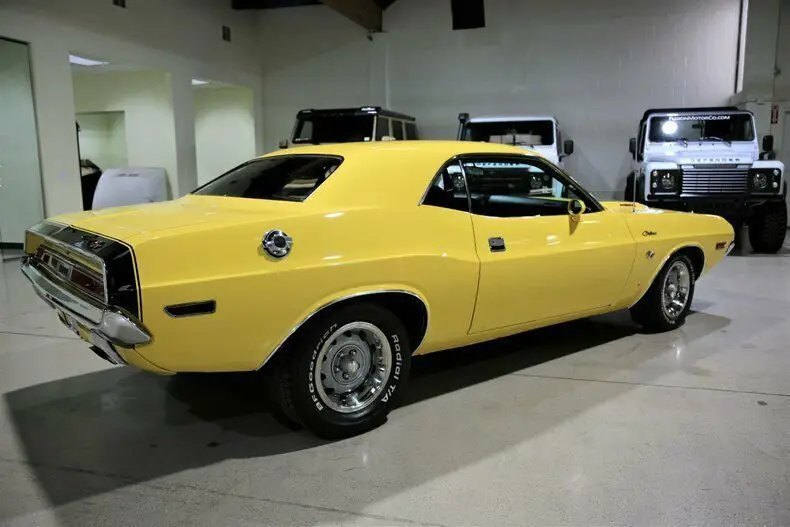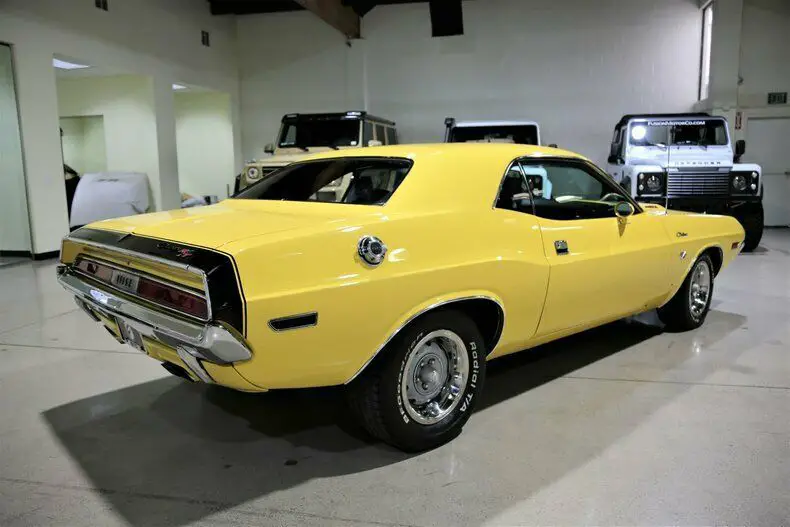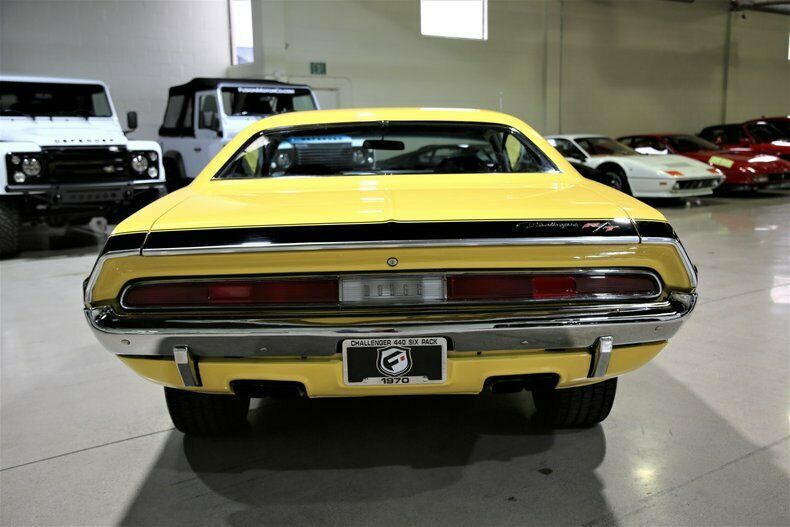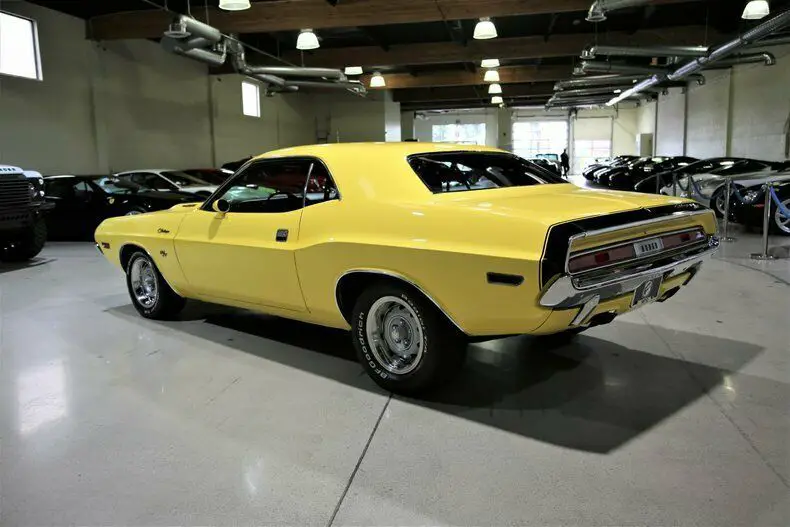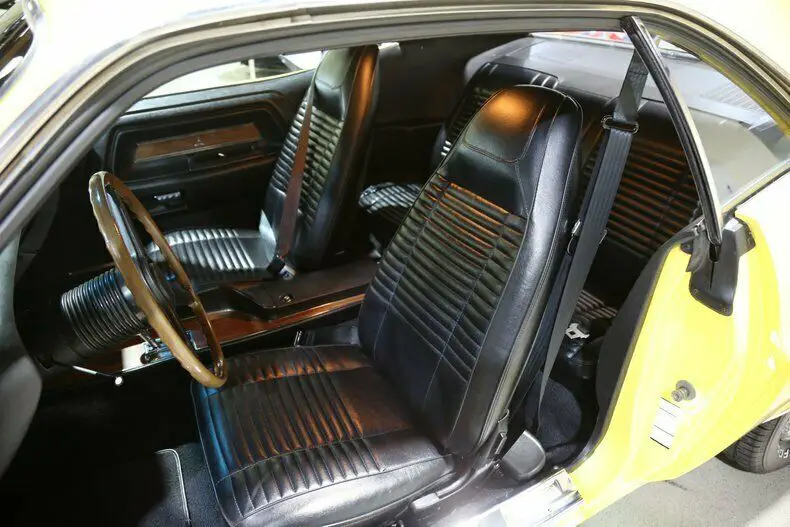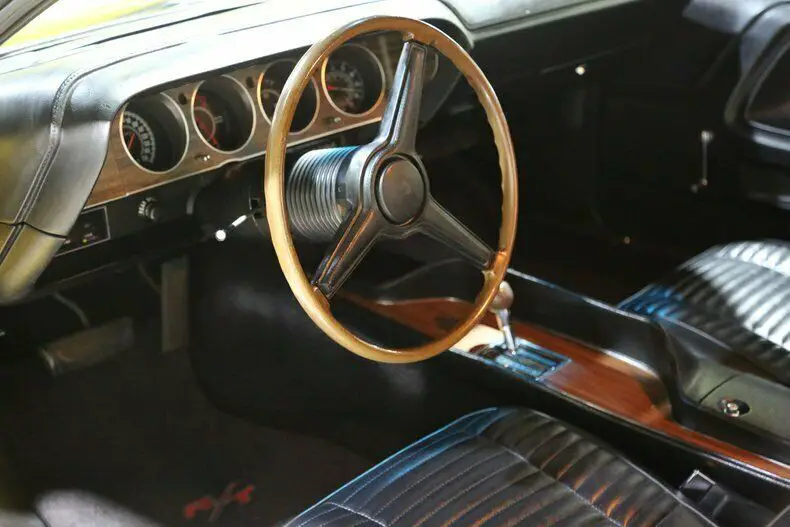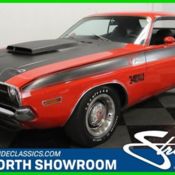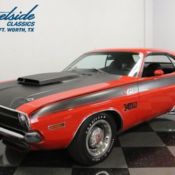1970 Dodge Challenger RT 440 Six Pack 17673 Miles Yellow Coupe 440 Six Pack 727
| Condition: | Used |
| Make: | Dodge |
| Model: | Challenger RT 440 Six Pack |
| Type: | Coupe |
| Year: | 1970 |
| Mileage: | 17673 |
| VIN: | JS23N0E124421 |
| Color: | Yellow |
| Engine: | 440 Six Pack |
| Fuel: | Gasoline |
| Transmission: | 727 Torqueflite |
| Drive type: | -- |
| Interior color: | Black |
| Vehicle Title: | Clear |
| Item location: | Local pick-up only |
| Extras |
|
-- -- |
| Listed by | Private seller |
Description of 1970 Dodge Challenger RT 440 Six Pack |
|
Presented here is a nut and bolt rotisserie restored 1970 Challenger R/T with a 440 Six-Pack. Believed to have just over 17,000 original miles, this Mopar was full restored in 2008 and was featured as a showcase piece at Summit Racing's headquarters. This is a Factory R/T that was originally born with a 383 and was professionally restored and outfitted with the vaunted 440 Six Pack that resides underneath the hood today. A complete binder of every single receipt is included along with detailed restoration photos. This R/T runs very strong and is absolutely stunning inside and out. This is an iconic muscle car that checks off all of the boxes. Great lease rates and Financing also available on any of our inventory! Buy Sell Trade Consignments Welcome! Please email or call 1-818-773-8181 About the Challenger: The Dodge Challenger is the name of three different generations of automobiles (two of those being pony cars) produced by Dodge. However, the first use of the Challenger name by Dodge was in 1959 for marketing a "value version" of the full-sized Coronet Silver Challenger. From model years 1970 to 1974, the first generation Dodge Challenger pony car was built using the Chrysler E platform in hardtop and convertible body styles sharing major components with the Plymouth Barracuda. Introduced in fall 1969 for the 1970 model year, the Challenger was one of two Chrysler E-body cars, the other being the slightly smaller Plymouth Barracuda. Positioned to compete against the Mercury Cougar and Pontiac Firebird in the upper end of the pony car market segment, it was "a rather late response" to the Ford Mustang, which debuted in April 1964. Even so, Chrysler intended the new Challenger as the most potent pony car ever, and like the less expensive Barracuda, it was available in a staggering number of trim and option levels, and with virtually every engine in Chrysler's inventory. The Challenger's longer wheelbase, larger dimensions, and more luxurious interior were prompted by the launch of the 1967 Mercury Cougar, likewise a bigger, more luxurious and more expensive pony car aimed at affluent young American buyers. The 110" wheelbase was 2" longer than the Barracuda's, and the Dodge differed substantially in its Sheetmetal, much as the Cougar differed from the shorter-wheelbase Mustang. Air conditioning and a rear window defogger were optional. Exterior design was penned by Carl Cameron, who was also responsible for the exterior designs of the 1966 Dodge Charger. Cameron based the 1970 Challenger grille on an older sketch of a stillborn 1966 Charger prototype that was to have a turbine engine. The pony car segment was already declining by the time the Challenger arrived. Sales fell dramatically after 1970, and though sales rose for the 1973 model year with over 27,800 cars being sold, Challenger production ceased midway through the 1974 model year. A total of 165,437 first generation Challengers were sold. For its introductory model year the Challenger was available in two series, Challenger and Challenger R/T, and three models, two-door hardtop, Special Edition two-door hardtop, or convertible. The base model was the Challenger with either an inline-6 or V8 engine. The Special Edition hardtop, available on either the base Challenger or on the R/T, added a number of appearance, convenience, and comfort features. Produced for the 1970 model year only, this more luxurious SE specification included as standard a vinyl roof with a "SE" medallions on the pillars, a smaller "formal" rear window, leather and vinyl bucket seats, and an overhead interior console that contained three warning lights, door ajar, low fuel, and seatbelts. The standard engine on the base model was a 225 cu in Straight-6. The standard engine on the higher trim models was a 318 cu in (5.2 L) V8 with a 2-barrel carburetor. For 1970, the optional engines included the 340 and 383 cu in (5.6 and 6.3 L), as well as the 440 and 426 cu in (7.2 and 7.0 L) V8s, all with a standard 3-speed manual transmission, except for the 290 HP 383 CI. engine, which was available only with the TorqueFlite automatic transmission. A 4-speed manual was optional on all engines except the 225 ci. Inline-6 and the 2-barrel 383 ci. V8. The performance model was the Challenger R/T (Road/Track), with a 383 cu in (6.3 L) "Magnum" V8, rated at 335 HP. The standard transmission was a 3-speed manual. Optional R/T engines were the 375 HP 440 ci (7.2 L) Magnum, the 390 HP 440 cu in (7.2 L) Six-Pack and the 426 cu in (7.0 L) Hemi rated at 425 HP at 5,000 rpm and 490 lb·ft of torque at 4,000 rpm. The R/T was available in either the hardtop or convertible. The Challenger R/T came with a Rallye instrument cluster that included a 150 mph speedometer, an 8,000 rpm tachometer and an oil pressure gauge. The shaker hood scoop was not available after 1971. |
 Home
Home Contact us
Contact us NEWEST CARS
NEWEST CARS SELL YOUR CAR
SELL YOUR CAR FAQ
FAQ

